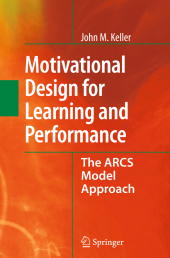 Neuerscheinungen 2010Stand: 2020-01-07 |
Schnellsuche
ISBN/Stichwort/Autor
|
Herderstraße 10
10625 Berlin
Tel.: 030 315 714 16
Fax 030 315 714 14
info@buchspektrum.de |

John M. Keller
Motivational Design for Learning and Performance
The ARCS Model Approach
2010. xix, 345 S. 120 SW-Abb. 235 mm
Verlag/Jahr: SPRINGER, BERLIN 2010
ISBN: 1-441-96579-3 (1441965793)
Neue ISBN: 978-1-441-96579-0 (9781441965790)
Preis und Lieferzeit: Bitte klicken
Introducing the reader to the core concepts of motivation and motivational design, this volume applies this knowledge to the design process in a systematic, step-by-step format. It takes the theoretically robust ARCS model as the basis for its approach.
It is impossible to control another person´s motivation. But much of the instructor´s job involves stimulating learner motivation, and learning environments should ideally be designed toward this goal. Motivational Design for Learning and Performance introduces readers to the core concepts of motivation and motivational design and applies this knowledge to the design process in a systematic step-by-step format.
The ARCS model-theoretically robust, rooted in best practices, and adaptable to a variety of practical uses-forms the basis of this problem-solving approach. Separate chapters cover each component of the model-attention, relevance, confidence, and satisfaction-and offer strategies for promoting each one in learners. From there, the motivational design process is explained in detail, supplemented by real-world examples and ready-to-use worksheets. The methods are applied to traditional and alternative settings, including gifted classes, elementary grades, self-directed learning, and corporate training. And the book is geared toward the non-specialist reader, making it accessible to those without a psychology or teaching background.
With this guide, the reader learns how to:
Identify motivation problems and goals
Decide whether the environment or the learners need changing
Generate attention, relevance, confidence, and satisfaction in learners
Integrate motivational design and instructional design
Select, develop, and evaluate motivational materials
Plus a wealth of tables, worksheets, measures, and other valuable tools aid in the design process
Comprehensive and enlightening, Motivational Design for Learning and Performance furnishes an eminently practical body of knowledge to researchers and professionals in performance technology and instructional design as well as educational psychologists, teachers and trainers.
John Keller, Ph.D. in Instructional Systems Technology and Organizational Behavior from Indiana University, is a Professor of Educational Psychology and Learning Systems at Florida State University. Prior to coming to FSU in January, 1985, he was a member of the faculty at Syracuse University which he joined in 1974 after finishing his doctoral program. Prior to going to graduate school, he taught English and multimedia in secondary school in Southern California after serving in the U.S. Marine Corps and earning his B.A. in philosophy at the University of California at Riverside. Since earning his Ph.D., he has gained extensive experience working with corporate, governmental, and educational organizations in the United States and abroad. He has made major contributions to the development of approaches to designing motivational systems and he has contributed to the design of performance improvement and systematic training design processes for several school districts, major corporations, and government agencies. In addition, he has extensive international experience, especially but not exclusively in Europe, South America, Northeast Asia, and Southeast Asia. He has delivered addresses, participated in conferences, and completed consultancies in more than 20 countries, and he recently completed a teaching assignment at the University of Salzburg, Austria. He is best known for the motivational design process he created that is called the "ARCS model." His current interests include the study of methods for improving learner motivation in undergraduate courses, motivation in mathematics education, and motivation in relation to technology integration in online and face-to-face instruction.


